Emergen C Vitamin C Benefits
The Untold Truth Of Emergen-C
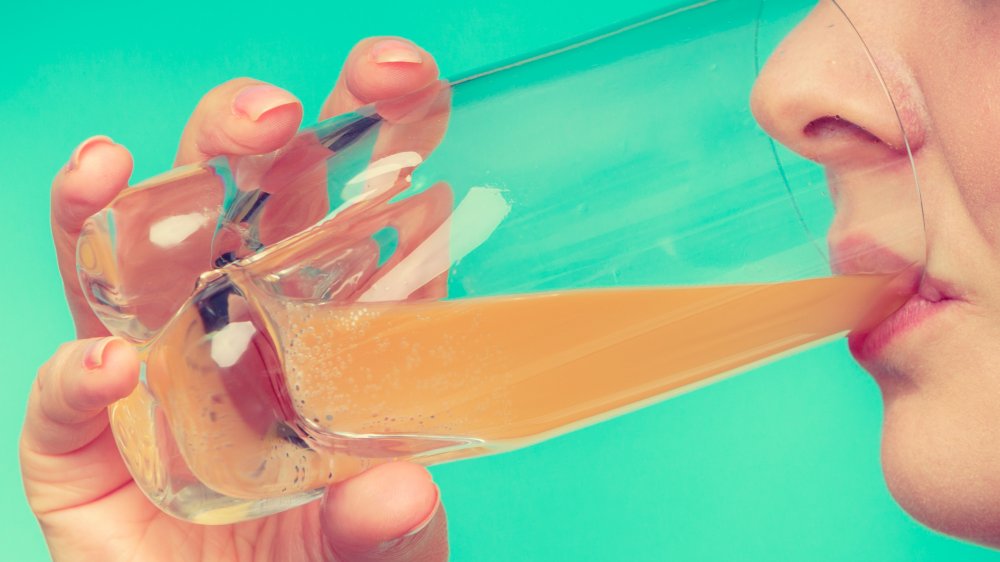
Shutterstock
Emergen-C, the vitamin C-packed dietary supplement, may be popular, but what does it really do? "A lot of patients ask me about these products, and many of them can be very adamant about how certain they are that it helps them," William Curry, internist and professor of internal medicine at the University of Alabama at Birmingham, revealed toHealth. The product itself promises "immune support," but the science is, well, a bit unclear.
According to Cynthia Sass, registered dietitian and contributing nutrition editor for Health, "The best way to keep your immune system strong is to eat healthfully, including vitamin C-rich produce, all the time." That's not to say Emergen-C isn't useful, though. "If your experience is that it's helpful for you," Curry noted, "then that's great."
Of course, even if you do find it helps you, have you stopped to wonder why that is? Have you ever looked into the ingredients of the the fizzy orange supplement or the brand's bold claims? Now's the time. Here's an inside look at the untold truth of Emergen-C.
Emergen-C has been around since the 1970s

Shutterstock
While vitamin and supplements have seriously gained traction over the past decade — especially with the rise of social media influencer shilling — these powdery, nutrient-dense mixes are nothing new.
According to Emergen-C's website, the "dietary supplement drink mix" was introduced all the way back in 1978 by the Alacer Corporation, based in Southern California. As the Emergen-C website states, the powdery substance "was quickly embraced by people seeking a refreshing way to support a healthy immune system." And, despite the controversy surrounding Emergen-C's effectiveness, the drink mix remains a popular dietary supplement today.
Of course, Emergen-C is far from the only dietary supplement of its kind. Still, the vitamin-packed orange powder is set apart by its Alka Seltzer-like fizz it creates when mixed with water. According to the manufacturer, this signature fizz is what caught the attention of consumers in the first place. "News of this fizzy sensation spread and Emergen-C vitamin drink mix found an impressive following, more and more people began mixing up the original citrus-y flavor to feel the good every day," the brand's website states.
What's even in Emergen-C?
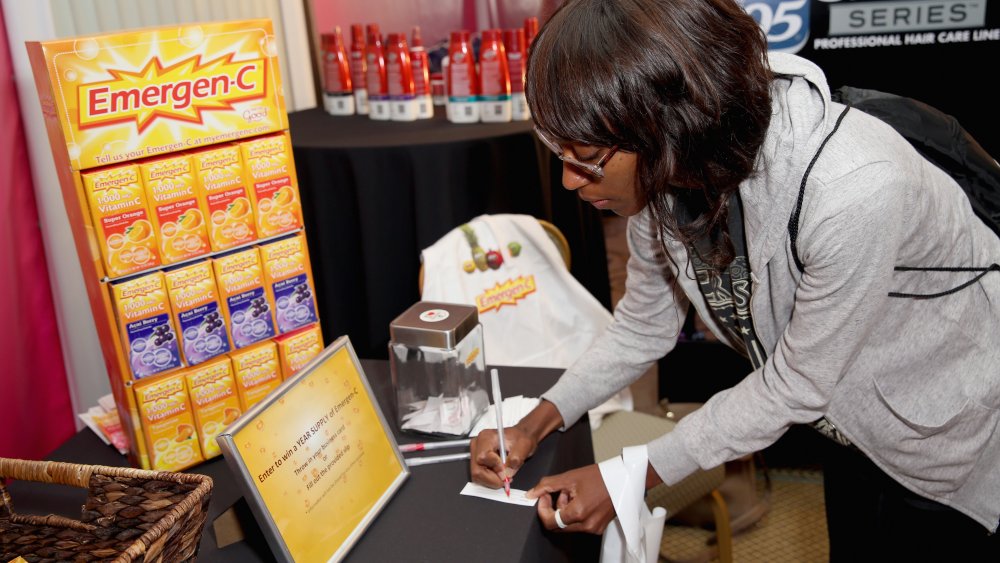
Chelsea Lauren/Getty Images
Aside from its fun, fizzy effect, Emergen-C has a tangy, citrusy taste that makes it all the more appealing to consumers. Unlike the myriad of other products that claim to fight colds and boost immune systems, Emergen-C seemingly manages to pack a nutrient-dense punch in an arguably yummy flavored way.
If you're wondering about the exact ingredients that make-up Emergen-C — supposedly fighting illness while tasting kind of like an orange creamsicle treat — you need not look further than Emergen-C's website, where the manufacturer has dedicated an entire page to detailing the vitamins and minerals packed within the powdery substance.
According to the exhaustive ingredients list, Emergen-C contains a mixture of antioxidants (vitamin C, vitamin E, zinc, manganese), B vitamins (thiamin, niacin, riboflavin, folic acid, vitamin B6, vitamin B12, pantothenic acid), electrolytes (calcium, magnesium, sodium, potassium, phosphorus), probiotics (BB-12, L. Rhamnosus GG), as well as other nutrients (melatonin, vitamin D, caffeine, ginseng, plant-based proteins, and superfoods). It's hard to imagine fitting that much good stuff in one little dose of powder, but Emergen-C manages to do the job.
Emergen-C has been taken to court

Shutterstock
As with many other vitamin and mineral supplements, Emergen-C has been met with plenty of skepticism from the medical community as well as consumers. In 2013, a class action lawsuit was filed against Alacer Corp., Emergen-C's manufacturer, alleging the company made false claims about the effectiveness of its popular product.
According to the lawsuit, the plaintiff claimed that Alacer Corp. "deceptively" marketed its Emergen-C product as a "supplement that 'supports' or 'boosts'" the user's immune system, thus saying that Emergen-C had a positive impact on the immune system and could be used to not only fight germs, but reduce the risk of contacting the common cold or even the flu.
According to TopClassActions.com, the lawsuit was settled for a whopping $6.45 million. However, the settlement didn't signal Alacer's admission of guilt. Instead, the company denied the allegations brought against itself and its product, insisting the statements it had made about Emergen-C's supposed health benefits were factual.
Emergen-C bills itself as being philanthropic

Shutterstock
While Emergen-C or, more specifically, Alacer Corp., has come under fire for misrepresenting its product, allegedly exaggerating its health benefits and cold-fighting power — the company does seem to be making a real-word effort to improve the lives of people all over the globe.
As detailed on Emergen-C's "Philanthropy" page of its website, the brand is a partner of Charity:Water. "We're not just transforming water; we're transforming lives," reads Emergen-C's website. It continues, "Through our multi-year commitment, we are embarking on a clean water project to help bring safe drinking water to communities in Ethiopia."
According to the site's statement on Emergen-C's philanthropic endeavors, the brand chose to partner with the charity because of the life-changing benefits clean water can have on a community, especially a community in which women and girls are often tasked with sourcing and gathering clean water. "Women and girls in Ethiopia spend up to [three] hours each day gathering water for their families," Emergen-C's site explains. It continues, adding, "With accessible clean water, women and children can get this valuable time back and spend it with their loved ones, change their future, start a business, and lead healthier lives."
Emergen-C probably works best for athletes and soldiers

Shutterstock
According to Vox, the idea that vitamin C could prove powerful in combatting colds and flu-like illnesses was made popular by Nobel prize-winning scientist Linus Pauling. In 1970, the scientist published a book called Vitamin C and the Common Coldin which he urged readers to incorporate 3,000 milligrams of vitamin C into their daily regimen for good health.
While Pauling's claims received immediate pushback from the medical community, the sales of vitamin C skyrocketed — proving Pauling's point had been heard. However, modern medicine today tells us Pauling was actually pretty off-track about the effectiveness of vitamin C. In fact, according to the Institute of Medicine (via HuffPost), adults shouldn't exceed 2,000 mg of vitamin C a day.
Moreover, a 2007 study (via HuffPost) demonstrated vitamin C only helps stave off colds for skiers, runners, and soldiers stationed in sub-arctic temperatures. For those of us living under normal weather conditions, vitamin C has been determined to reduce the length of colds when taken as a preventative measure. However, if you down some Emergen-C hoping to get rid of the nagging cold you've had for days, you're going to be disappointed.
Emergen-C didn't have to pass a safety and efficacy test before hitting the market
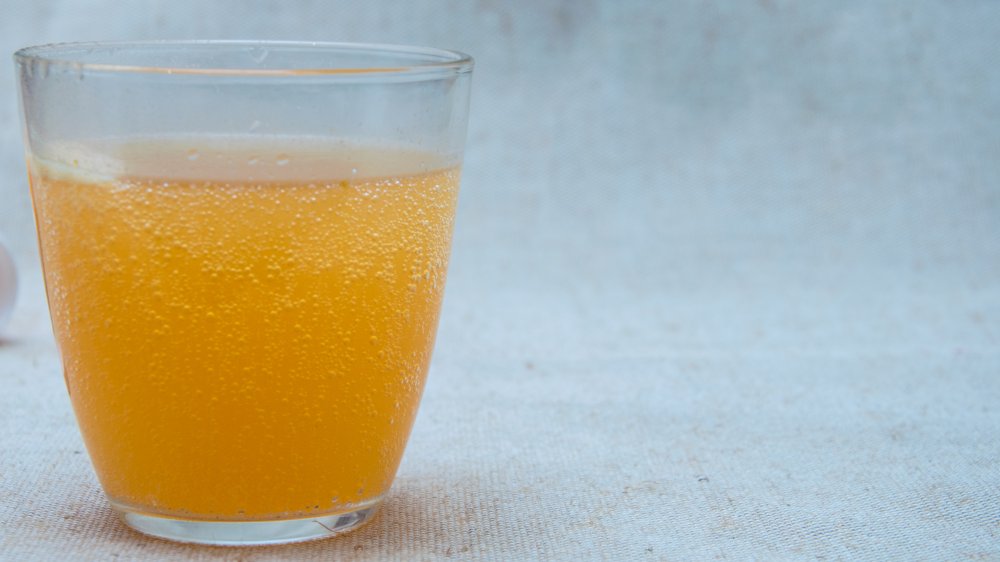
Shutterstock
Keeping up with every single health and nutritional product on the market is quite a difficult task. After all, products aren't just being pitched to consumers on TV, in the newspapers, and at the supermarkets, the rise of social media and targeted advertising means so-called nutritional supplements are also being shoved in consumers' faces online.
However, it's important to remember that marketing is rarely an indicator of a product's effectiveness. In other words, even if a health supplement has a catchy jingle, pretty packaging, or a memorable commercial, the quality of the product could still be subpar – and perhaps even bad for your health. In fact, asPublic Radio International pointed out, the Dietary Supplement Health and Education Act of 1994 dictated that dietary supplements weren't required to pass safety or efficacy tests before hitting the market, allowing Emergen-C and other similar products to go virtually unchecked. This means many dietary supplements remain able to claim amazing health benefits without actually providing proof.
Unfortunately for staunch Emergen-C supporters, the non-FDA approved fizzy orange supplement hasn't, as of this writing, been thoroughly tested for safety or effectiveness so its so-called benefits are up for debate.
According to experts, there's no real way to tell if Emergen-C even works

Shutterstock
While Emergen-C definitely has a large fanbase, the orange vitamin powder certainly has its fair share of critics as well. Of course, the majority of said critics are skeptical of the product's advertised "immune support" formula, which has not been approved by the FDA nor been tested for safety nor efficacy. Subsequently, those who swear by the fizzy citrus drink may find trying to convince a naysayer of Emergen-C's health benefits to be frustrating — and perhaps even impossible.
According to Howard Sesso, an epidemiologist and associate professor of medicine at Boston's Brigham and Women's Hospital, without experiments specifically testing the effectiveness of Emergen-C (as well as competing products, such as Airborne), there's really no way of proving how or why it works.
Sesso told HuffPost, "It would be very difficult to know, even if it did work, is it because of Vitamin C, or is it because of Zinc?" The epidemiologist continued, musing, "Is it because of something completely unrelated, or something that we don't yet know about?"
There's more than just one Emergen-C product
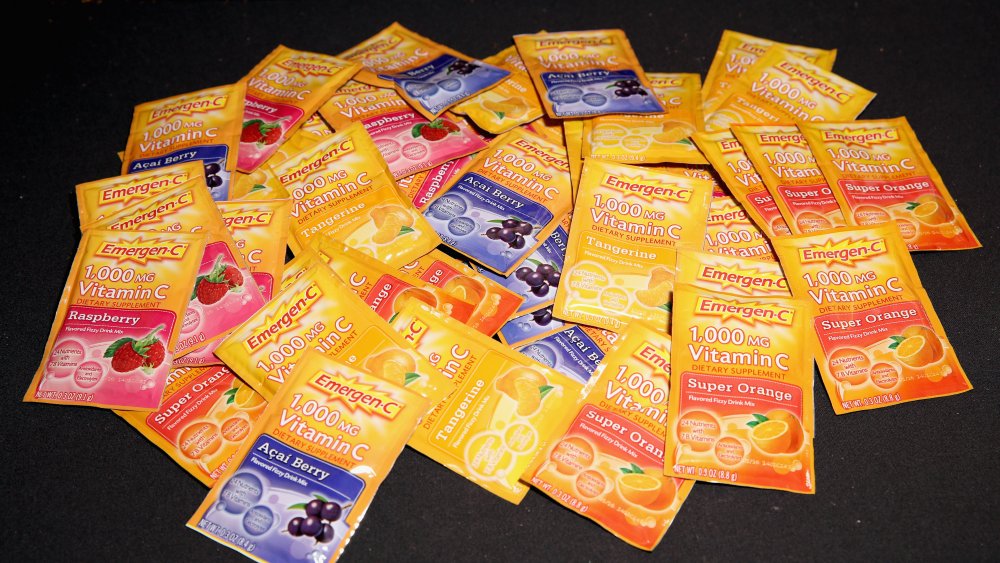
Chelsea Lauren/Getty Images
When you think of Emergen-C, you likely think of an orange-flavored powder that adds a fizzy kick to an otherwise plain glass of water. However, "Super Orange" is but one flavor of Emergen-C's Daily Immune Support line. Although it may be the most well-known product, it's far from the only supplement — or line — the Emergen-C brand has to offer.
According to the "Products" section of Emergen-C's website, the dietary supplement comes in many different forms and flavors. The brand's "enhanced immune support" products under the Immune+ line are fizzy, vitamin mixers that you can get in flavors like raspberry and blueberry-açai. Emergen-C's Energy+ supplements also come in multiple flavors so you're not limited to citrus. Emergen-C even offers a hydrating formula, which is, according to the brand, similar to a sports drink, but with less sugar.
In addition to all of its energizing, supposedly immune-boosting supplements, Emergen-C also offers a sleep-aid for those looking to catch up on their beauty rest. Cleverly called Emergen-Zzzz, the supplement contains melatonin, appears dark pink when added to water, and tastes like a mixture of raspberries and blueberries. Yum!
Some people use Emergen-C to cure hangovers

Shutterstock
Anyone who's ever spent a night on the town drinking with their friends knows the value of a tried-and-true hangover cure. While taking a couple Tylenol and drinking a glass of water before going to bed after an alcohol-fueled night out may work for some, other people need a little something extra to fight the next day's hangover headache and general tiredness.
Speaking with Insider, Los Angeles-based bartender Kellie Norris said her go-to hangover fix is a fizzy cure-all. "One packet of Emergen-C and one packet of Alka Seltzer dissolved in a glass of club soda works as a next-day cure," Norris revealed.
And it seems Norris is not alone in using Emergen-C as a hangover remedy. Cosmopolitan dubbed the dietary supplement a "hangover hack every twentysomething should know," recommending readers to combine the orange powder with a vitamin B complex pill. "The vitamin B complex replenishes what alcohol depletes and the fizzy vitamin C helps with overall wellness," Cosmopolitan writer Laura Beck explained. Of course, these —and really all other hangover hacks — should be taken with a grain of (margarita) salt.
Medical professionals see Emergen-C as a nightmare during flu season

Shutterstock
Many may look to Emergen-C to get an energy boost or use it as a preventative measure to reduce the length of a future cold. Others may use it to replenish their bodies with vitamins and nutrients after drinking the night away. Regardless, it's important not to rely on the fizzy drink mix for all of your health needs. Specifically, doctors warn that Emergen-C shouldn't be considered an alternative to getting your flu shot.
Amesh Adalja, infectious disease physician and a senior scholar at the Johns Hopkins Center for Health Security, told Women's Health that Emergen-C has not been proven to work as a flu preventative, despite the supplement's "immune boosting" claims. "Emergen-C is a vitamin C supplement, and there's no evidence that it benefits people with the cold or influenza or [that it] affects your propensity to get the cold or the flu," he explained.
The doctor continued, telling Women's Health he worries that the marketed benefits of taking Emergen-C will deter the general public away from the one thing that has actually been proven to help prevent influenza during flu season: the flu vaccine.
Emergen-C could be harmful to your health

Shutterstock
Considering Emergen-C hasn't been tested for the safety nor efficacy of its product, it should come as no big surprise that the vitamin-packed, powdery "health" supplement could, in fact, be harmful to your health.
According to William Curry, internist and professor of internal medicine at the University of Alabama at Birmingham, consuming more than the recommended amount of Emergen-C could make you feel pretty sick. As Curry told Health, taking more than 2,000 mg of vitamin C per day might even send you to the hospital with kidney stones. Apparently, too much of a good thing can be a bad thing and, unfortunately, Emergen-C's tasty flavor makes it all too easy to overdose on the stuff.
However, the doctor said he doesn't have a problem with his patients using Emergen-C — as long as they understand the risks (as well as the seemingly barely-there benefits). "As long as you're not taking enough to hurt yourself, and you recognize that the benefit is unclear, I don't have a problem with patients who use these products," he told Health.
No, you shouldn't mix Emergen-C with alcohol

Shutterstock
There's no doubt that Emergen-C's fruity, citrusy flavor is a large part of the dietary supplement's appeal. However, as tasty as you may find the fizzy vitamin drink mix, it should never be used to add a flavorful, vitamin-rich punch to your favorite cocktail. And, if you don't believe us, take it straight from Emergen-C's mouth — er, Twitter account.
On March 12, 2020, Twitter user Marilyn Starkloff took to the social media platform to show off her beverage of choice while self-quarantining during the global coronavirus pandemic. Posting a photo featuring an open packet of Emergen-C, a mini-bottle of Aviation American gin, and martini glass containing a pale-orange liquid, Starkloff wrote, "Time for a quarantini."
Considering the photo got a significant number of likes, it's safe to say other Twitter users approved of Starkloff's clever creation. However, a day later, the official Emergen-C Twitter account issued a warning in the form of a comment on Starkloff's post. "We do not recommend taking any of our products with alcohol," Emergen-C tweeted in response to Starkloff.
Can Emergen-C protect against pandemics?
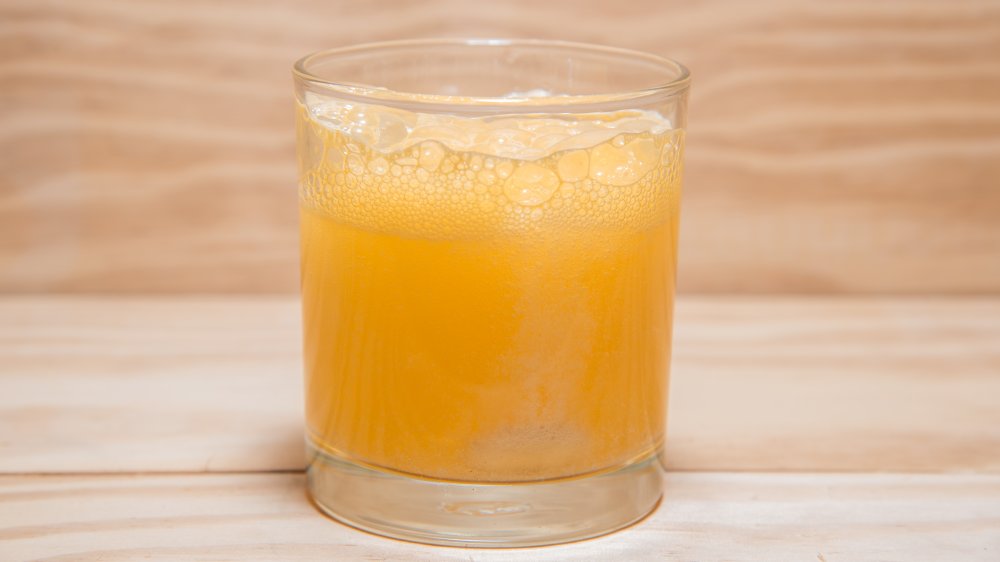
Shutterstock
Since outbreak of the novel coronavirus, people have been scrambling to get their hands on products they hope will protect them against contracting the virus. That includes face masks, gloves, hand sanitizer, disinfecting wipes, et cetera.
Naturally, many folks also wondered if using Emergen-C daily would keep them from falling ill. In fact, according toThe New York Times, pharmacies throughout the United States were forced to place a limit on amount of "vitamins, Zicam, Emergen-C and other supplements" customers could purchase during the pandemic, due to their short supply.
However, register dietitian Ashley Koff warned against overloading yourself with Emergen-C during the pandemic panic. "This is the time to start implementing behaviors that support your health, not going and taking high amounts of things that are incorrectly listed as immune boosters," the expert told The New York Times. Linda Van Horn, chief of nutrition at Northwestern University Feinberg School of Medicine's preventive medicine department, also advised "look[ing] at what you're eating" and choosing "fresh produce and other healthy foods" if at all possible.
Source: https://www.thelist.com/196880/the-untold-truth-of-emergen-c/

0 Komentar